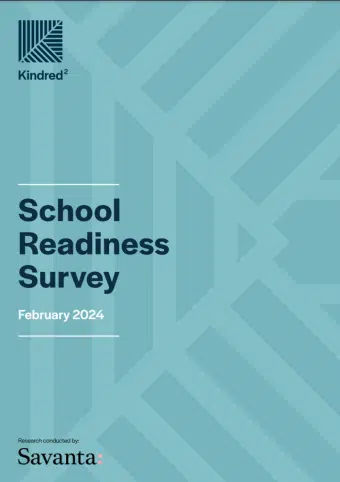28th February 2024
Findings from Kindred2 “annual school readiness survey” were published today and report that more children in England and Wales are starting school without the basic skills needed to learn, leaving them disadvantaged from the start. The findings from this important survey provide a stark warning to policymakers, educationalists and practitioners working to give every child the best start in life, including health visitors.
To understand “school readiness” for children starting Reception last autumn, the early years charitable foundation Kindred2 commissioned Savanta to conduct focus groups and survey over 1,000 teachers and 1,000 parents of Reception children:
- More than three-quarters of teachers say they are spending more time supporting children who are not school ready.
- 1 in 4 children are starting school not toilet trained.
- 30% of children can’t communicate their needs to tell teachers if they are hungry or scared or need to go to the toilet. More than a third couldn’t dress themselves.
- A quarter don’t have basic language skills.
According to the survey, nearly half (46%) of pupils are unable to sit still, 38% struggle to play or share with others, more than a third (37%) cannot dress themselves, 29% cannot eat or drink independently, and more than a quarter (28%) are using books incorrectly, swiping or tapping as though they were using a tablet.
Half of teachers say the problem is worse than last year and every child loses out as an estimated 2.5 hours of teacher time is lost each day; and 9 in 10 teachers say this impacts the rest of the class.
Schools say pressures are also affecting staff retention: almost half (47%) of the teachers in the survey said they are considering leaving their current role, and nearly a quarter (23%) plan on doing so in the next year.
49% of parents think that some children start school not ready because parents are unaware of the expectations of school readiness. The report also highlighted that “early help” was patchy with wide variation in the level of support that families received from a health visitor. More than one in five (22%) of parents had received no visits from a health visitor before their child started school, and the majority (63%) had two visits or fewer. 69% of school staff think parents need more guidance about child development milestones.
The full report includes comments from focus groups held with teachers and parents:
“Over the last 20 years… we’ve noticed a change in the children – the children at entry points from when they come into Reception are not as school ready as they were when I first started.” – Teacher
Felicity Gillespie, Director at Kindred², said:
“The shocking findings in this year’s report should be a watershed moment for schools and parents because we know that children who are behind before they begin Reception are more likely to struggle throughout life. The 40% attainment gap we see at GCSE is already evident at age 5… we need to question why the critically important first key stage of our education system doesn’t start until age five – when we know that we all start learning from birth.”
Alison Morton, iHV CEO, said:
“Health visitors have a vital role to play in ensuring that all children are supported to be ready for school. When adequately resourced, they are in a privileged position as the only service that proactively and systematically reaches all families with babies and young children – we need to maximise these important opportunities to prevent and identify problems early to ensure that all children get the support that they need to be ready to learn when they start school. However, following years of cuts to the health visiting service, too many families are not receiving this vital support. Cuts have consequences and sadly children are the innocent victims. We urgently need more health visitors.”



